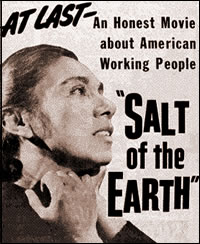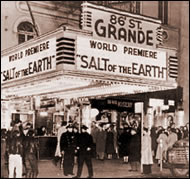Posted March 8, 2010
In the yet-to-be written guide to badass feminist entertainment, the classic 1954 movie Salt of the Earth belongs right next to classic rap trio Salt-N-Pepa (any takers on that article?)
 One of the best political movies ever made in the US, Salt of the Earth combines the Old Left labor movement of the 1930s and the blossoming of Chicano and Women’s Liberation politics in the late ’60s – but it was filmed fifteen years earlier, under the thick shadow of McCarthyism. Dramatizing the interwoven struggles against sexism, racism, and class exploitation in 94 minutes of low-budget black and white cinematography — as this film does to tell the real-life story of a mining town strike — is a tall order.
One of the best political movies ever made in the US, Salt of the Earth combines the Old Left labor movement of the 1930s and the blossoming of Chicano and Women’s Liberation politics in the late ’60s – but it was filmed fifteen years earlier, under the thick shadow of McCarthyism. Dramatizing the interwoven struggles against sexism, racism, and class exploitation in 94 minutes of low-budget black and white cinematography — as this film does to tell the real-life story of a mining town strike — is a tall order.
But on top of artistic hurdles, the production faced political obstacles ranging from vigilante attacks, to boycotts, and even deportation of the lead actress. Salt of the Earth, then, is a tale of struggle and resistance both in front and behind the lens.
Even the opening titles have a backstory and credentials for the radical, outsider nature of the movie. Independent Productions Corporation and International Union of Mine, Mill, and Smelter Workers: the first, a filmmaking enterprise formed by Hollywood communists who’d been blacklisted and jailed for refusing to inform before HUAC; the second, a militant union (in fact, the one depicted in the film) driven from the CIO for refusing to purge communists from its ranks and leadership. By Michael Wilson… directed by Herbert Biberman: screenwriter Wilson and his comrade Biberman, had both been thrown out of Hollywood, and jailed, for their radical views. They used this as an opportunity to make the movie that Hollywood could not: based in on a grueling 15-month miner’s strike, with a working-class feminist point of view, starring and co-written with the actual people it portrayed.
Rosaura Revueltas: the star actress was one of the few with on-screen experience, in her home in Mexico. She would be illegally deported during filmmaking in an effort to shut down production (the only other professional actor, Will Greer, was a close friend of Woody Guthrie and Harry Hay, a communist who at about this time was busy creating one of the first gay political organizations.) Later, Revueltas lived in Germany, where she worked with Marxist playwright Bertoldt Brecht. Juan Chacón, who plays her mineworker husband, was also literally playing himself — he’d been union leader during the strike and would continue a lifetime of labor militancy until his 1985 death.
 During filming, along with the deportation of Revueltas, the rest of the cast and crew faced threats, a near-boycott of production supplies encouraged by the Catholic Church, and investigation by the FBI and HUAC. Despite this, Salt they finished — but then it took nearly a year to complete the physical print due to studio blacklisting. And after the premiere, the anti-communist projectionist’s union instructed its members to not screen the film! It wasn’t until the strong social movements a decade later (which Salt of the Earth anticipates) that the movie would be excavated from its marginalization and fully appreciated.
During filming, along with the deportation of Revueltas, the rest of the cast and crew faced threats, a near-boycott of production supplies encouraged by the Catholic Church, and investigation by the FBI and HUAC. Despite this, Salt they finished — but then it took nearly a year to complete the physical print due to studio blacklisting. And after the premiere, the anti-communist projectionist’s union instructed its members to not screen the film! It wasn’t until the strong social movements a decade later (which Salt of the Earth anticipates) that the movie would be excavated from its marginalization and fully appreciated.
Here’s the original trailer:
A film in which women emerge as the heroic equals of men…
Then the movie opens. “Our roots in this place,” says Revuelas in voice-over, “go deeper than the mineshafts.” Salt takes the side of its protagonists not just as workers, but as Chicanos and Chicanas with a history and culture of resistance. Deep in the earth, the Mexican miners (led by Chacon as Ramon Quintero) face discrimination from their Anglo coworkers and the company, working the dirtiest and most dangerous jobs. And above (as Revueltas as his wife Esperanza is quick to point out) women and children deal with sanitation and health problems, high rents and high prices at the company store – while Anglo miners’ wives enjoy hot running watter at home.
Both groups begin to organize – and the miners begin a strike for equality.
…And men learn about sex equality the hard way
But while they are quick to denounce the racist exploitation they deal with, the men refuse to take seriously the demands of the women — who ask that non-workplace issues important to them be taken up by the union.
The film also takes a stand against the Taft-Hartley Act, which the mining company employs to stop the men’s picket and seemingly defeat the strike, until women take the lead in one of the most powerful scenes…
Below is an embedded file of the whole movie. You can also download it for free here. There aren’t subtitles available, but non-hearing viewers or people who might wish to translate the film can find the screenplay here.

Comments
2 responses to “Salt of the Earth, Classic of Feminist Cinema [Full Video]”
n/t
where can I screen it?